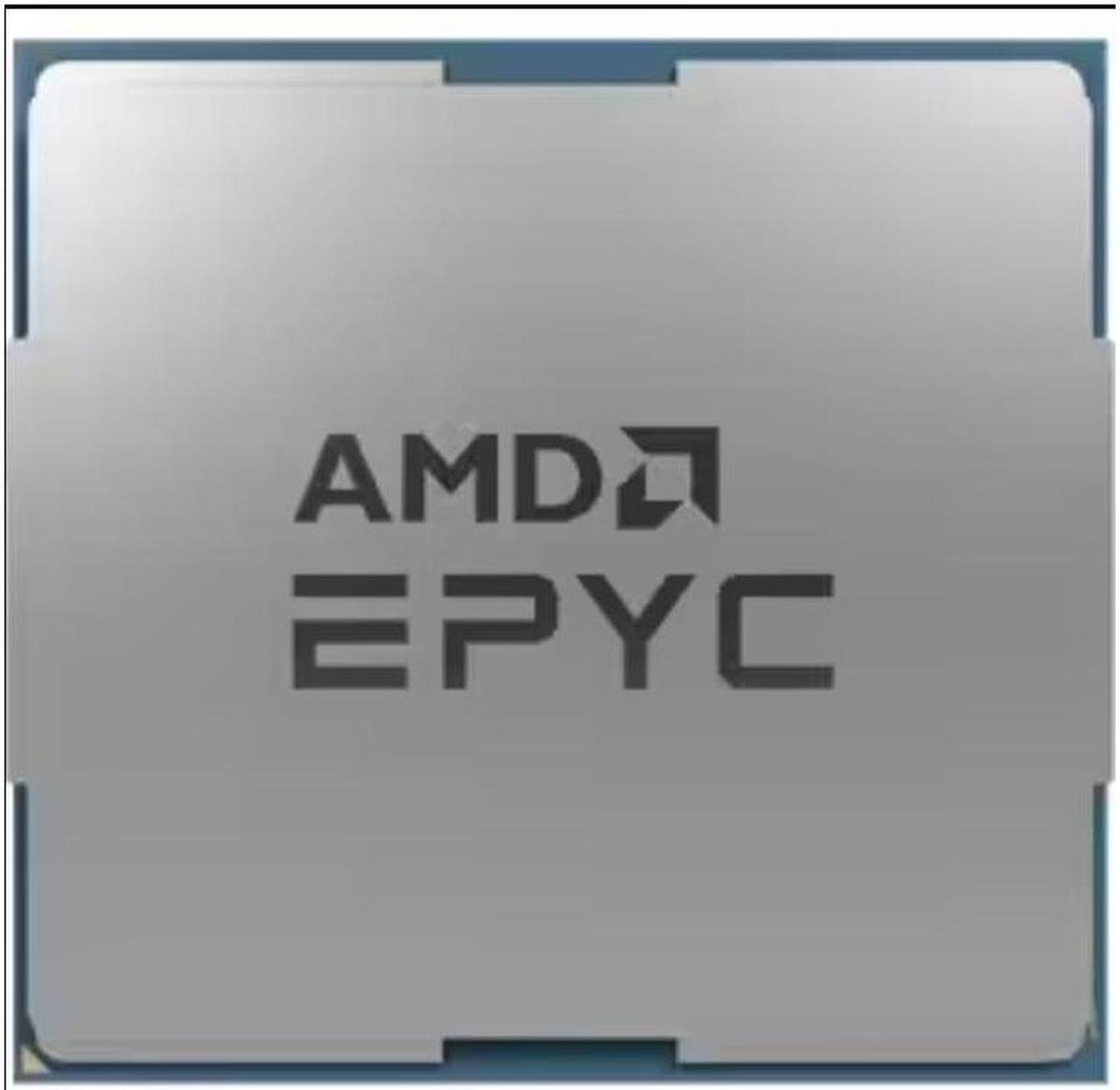


4th Generation AMD EPYC™ Processors
Advancing Data Center Performance & Efficiency
An EPYC™ Processor for Any Workload
No matter what the workload demands are, the 4th Gen AMD EPYC™ processor portfolio offers a solution to advance your business. From general purpose to edge computing, there is a processor to meet every data center need.
Performance and AI Optimized


Performance You Want
AMD EPYC™ Processors power optimized high-performance x86 servers for the most demanding general purpose and AI-enabled data center workloads.


Efficiency You Need
AMD EPYC™ processors power the most energy-efficient x86 servers, helping you reduce energy costs and meet corporate sustainability goals.1


Security
Data security threats are increasing and evolving, requiring vigilance and reliable support from platform providers. AMD EPYC™ processors include a comprehensive suite of security features, AMD Infinity Guard, that help keep your data safe in the expanding landscape of AI and cloud adoption.2
Exceptional Performance and Efficiency
AMD EPYC™ 9004 processor-based servers deliver transformative experiences across some of the most popular Enterprise and AI workloads.
- 60% increase enterprise critical operation throughput – maintain SLAs3
* SPECjbb®2015-MultiJVM Critical-jOPS 2P 96C EPYC™ 9684X vs. 2P 64C Xeon Platinum 8592+ - 2.1x the speed time-to-market running HPC Computational Fluid Dynamics4
* ANSYS® Fluent® 2022 R2 Test Cases 2P 96C EPYC™ 9684X vs. 2P 56C Xeon 8480+ - 2.7x the performance-per-system watt - lower server energy costs5
* SPECpower_ssj®2008 overall ssj_ops/W 2P128C EPYC™ 9754 vs. 2P 128C Altra® Max M128-30 - 65% More Total AI Use Case Throughput/min6
* TPCx-AI SF30 2P 96C EPYC™ 9654 vs 2P 64C Xeon 8582+-
AMD EPYC™ Processors power the highest-performing x86 servers for the modern data center with World Record performance across major industry benchmarks.
- 94 Business Applications World Records
- 51 Data Management and Analytics World Records
- 180 HPC/Technical Applications World Records
- 42 Infrastructure/HCI/SDI World Records
- 48 Energy Efficiency World Records
AMD EPYC™ Family of Processors as of 5/02/2024 see amd.com/worldrecords for the full list.
Innovative Design for a Wide Range of Workloads
The 4th Generation AMD EPYC™ processor family includes a broad portfolio of offerings for AI, general purpose, and workload-optimized solutions.

These processors include up to 128 “Zen 4” or “Zen 4c” cores with exceptional memory bandwidth and capacity. The innovative AMD chiplet architecture enables high performance, energy-efficient solutions optimized for your different computing needs.

AI, General Purpose, and Enterprise Computing
EPYC™ 9004 Series Processors
Drive exceptional time-to-results for your business-critical applications with AMD EPYC™ 9004 processors. Formerly codenamed “Genoa”, this CPU series features exceptional performance and is optimized for a wide range of workloads spanning from the enterprise to the cloud.
- Accelerate workloads with high-per-core-performance 9004F model CPUs.
- Modernize data center footprint and reduce energy consumption
- Minimize TCO while maximizing results across a wide range of workloads

Technical Computing
EPYC™ 9004 Series Processors with AMD 3D V-Cache™ Technology
Reach new heights to help solve some of today’s most complex design and simulation challenges with AMD EPYC™ 9004 Series Processors with 3D V-Cache™ Technology, formerly codenamed “Genoa-X”.
- Deliver breakthrough performance with up to 96 “Zen 4” cores and 1152 MB of L3 cache per socket
- Accelerate product design and enable low CAPEX and OPEX
- Boost the productivity of your demanding design and simulation workloads with high performance x86 server processors for technical computing.

Cloud-Native Computing
EPYC™ 97x4 Series Processors
4th Gen AMD EPYC™ 97x4 processors, formerly codenamed “Bergamo”, offer the performance, density, and energy efficiency to provide no-compromise computing for growing cloud native environments.
- System-level thread density for the scalable performance needed by cloud-native workload growth and infrastructure consolidation
- Extensive x86 software compatibility
- A full ecosystem of services to support fast, seamless deployment

Cloud Services, Intelligent Edge, and Telco Computing
EPYC™ 8004 Series Processors
AMD EPYC™ 8004 Processors, formerly codenamed “Siena”, designed to be a highly energy efficient CPU for single-socket platforms. With up to 64 “Zen 4c” cores and 6 channels of DDR5 memory in a small footprint, these processors are ideal for space and power-constrained deployments.
- Excellent performance in a power envelope as low as 70 watts
- NEBS-friendly and extended operating range for quieter operations and non-data center deployments
- Optimizes performance for the cloud, a telco network, a retail setting, or the intelligent edge
Partner Solutions
AMD works with a variety of partners to design and develop optimized solutions featuring 4th Gen AMD EPYC™.

Comparison
9004 Series Processors
Name |
# of CPU Cores |
# of Threads |
Max. Boost Clock7 |
Base Clock |
L3 Cache |
Default TDP |
| AMD EPYC™ 9754S | 128 | 128 | Up to 3.1 GHz | 2.25 GHz | 256 MB | 360W |
| AMD EPYC™ 9754 | 128 | 256 | Up to 3.1 GHz | 2.25 GHz | 256 MB | 360W |
| AMD EPYC™ 9734 | 112 | 224 | Up to 3 GHz | 2.2 GHz | 256 MB | 340W |
| AMD EPYC™ 9684X | 96 | 192 | Up to 3.7 GHz | 2.55 GHz | 1152 MB | 400W |
| AMD EPYC™ 9654P | 96 | 192 | Up to 3.7 GHz | 2.4 GHz | 384 MB | 360W |
| AMD EPYC™ 9654 | 96 | 192 | Up to 3.7 GHz | 2.4 GHz | 384 MB | 360W |
| AMD EPYC™ 9634 | 84 | 168 | Up to 3.7 GHz | 2.25 GHz | 384 MB | 290W |
| AMD EPYC™ 9554P | 64 | 128 | Up to 3.75 GHz | 3.1 GHz | 256 MB | 360W |
| AMD EPYC™ 9554 | 64 | 128 | Up to 3.75 GHz | 3.1 GHz | 256 MB | 360W |
| AMD EPYC™ 9534 | 64 | 128 | Up to 3.7 GHz | 2.45 GHz | 256 MB | 280W |
| AMD EPYC™ 9474F | 48 | 96 | Up to 4.1 GHz | 3.6 GHz | 256 MB | 360W |
| AMD EPYC™ 9454P | 48 | 96 | Up to 3.8 GHz | 2.75 GHz | 256 MB | 290W |
| AMD EPYC™ 9454 | 48 | 96 | Up to 3.8 GHz | 2.75 GHz | 256 MB | 290W |
| AMD EPYC™ 9384X | 32 | 64 | Up to 3.9 GHz | 3.1 GHz | 768 MB | 320W |
| AMD EPYC™ 9374F | 32 | 64 | Up to 4.3 GHz | 3.85 GHz | 256 MB | 320W |
| AMD EPYC™ 9354P | 32 | 64 | Up to 3.8 GHz | 3.25 GHz | 256 MB | 280W |
| AMD EPYC™ 9354 | 32 | 64 | Up to 3.8 GHz | 3.25 GHz | 256 MB | 280W |
| AMD EPYC™ 9334 | 32 | 64 | Up to 3.9 GHz | 2.7 GHz | 128 MB | 210W |
| AMD EPYC™ 9274F | 24 | 48 | Up to 4.3 GHz | 4.05 GHz | 256 MB | 320W |
| AMD EPYC™ 9254 | 24 | 48 | Up to 4.15 GHz | 2.9 GHz | 128 MB | 200W |
| AMD EPYC™ 9224 | 24 | 48 | Up to 3.7 GHz | 2.5 GHz | 64 MB | 200W |
| AMD EPYC™ 9184X | 16 | 32 | Up to 4.2 GHz | 3.55 GHz | 768 MB | 320W |
| AMD EPYC™ 9174F | 16 | 32 | Up to 4.4 GHz | 4.1 GHz | 256 MB | 320W |
| AMD EPYC™ 9124 | 16 | 32 | Up to 3.7 GHz | 3 GHz | 64 MB | 200W |
9004 Series with 3D V-Cache™ Technology
Name |
# of CPU Cores |
# of Threads |
Max. Boost Clock7 |
Base Clock |
L3 Cache |
Default TDP8 |
| AMD EPYC™ 9684X | 96 | 192 | Up to 3.7 GHz | 2.55 GHz | 1152 MB | 400W |
| AMD EPYC™ 9384X | 32 | 64 | Up to 3.9 GHz | 3.1 GHz | 768 MB | 320W |
| AMD EPYC™ 9184X | 16 | 32 | Up to 4.2 GHz | 3.55 GHz | 768 MB | 320W |
97x4 Processors
Name |
# of CPU Cores |
# of Threads |
Max. Boost Clock7 |
Base Clock |
L3 Cache |
Default TDP8 |
| AMD EPYC™ 9754S | 128 | 128 | Up to 3.1 GHz | 2.25 GHz | 256 MB | 360W |
| AMD EPYC™ 9754 | 128 | 256 | Up to 3.1 GHz | 2.25 GHz | 256 MB | 360W |
| AMD EPYC™ 9734 | 112 | 224 | Up to 3 GHz | 2.2 GHz | 256 MB | 340W |
8004 Series Processors
Name |
# of CPU Cores |
# of Threads |
Max. Boost Clock7 |
Base Clock |
L3 Cache |
Default TDP |
| AMD EPYC™ 8534PN | 64 | 128 | Up to 3.1 GHz | 2 GHz | 128 MB | 175W |
| AMD EPYC™ 8534P | 64 | 128 | Up to 3.1 GHz | 2.3 GHz | 128 MB | 200W |
| AMD EPYC™ 8434PN | 48 | 96 | Up to 3 GHz | 2 GHz | 128 MB | 155W |
| AMD EPYC™ 8434P | 48 | 96 | Up to 3.1 GHz | 2.5 GHz | 128 MB | 200W |
| AMD EPYC™ 8324PN | 32 | 64 | Up to 3 GHz | 2.05 GHz | 128 MB | 130W |
| AMD EPYC™ 8324P | 32 | 64 | Up to 3 GHz | 2.65 GHz | 128 MB | 180W |
| AMD EPYC™ 8224PN | 24 | 48 | Up to 3 GHz | 2 GHz | 64 MB | 120W |
| AMD EPYC™ 8224P | 24 | 48 | Up to 3 GHz | 2.55 GHz | 64 MB | 160W |
| AMD EPYC™ 8124PN | 16 | 32 | Up to 3 GHz | 2 GHz | 64 MB | 100W |
| AMD EPYC™ 8124P | 16 | 32 | Up to 3 GHz | 2.45 GHz | 64 MB | 125W |
| AMD EPYC™ 8024PN | 8 | 16 | Up to 3 GHz | 2.05 GHz | 32 MB | 80W |
| AMD EPYC™ 8024P | 8 | 16 | Up to 3 GHz | 2.4 GHz | 32 MB | 90W |
1. EPYC-028D: SPECpower_ssj® 2008, SPECrate®2017_int_energy_base, and SPECrate®2017_fp_energy_base based on results published on SPEC’s website as of 2/21/24. VMmark® server power-performance / server and storage power-performance (PPKW) based results published at https://www.vmware.com/products/vmmark/results3x.1.html?sort=score. The first 105 ranked SPECpower_ssj®2008 publications with the highest overall efficiency overall ssj_ops/W results were all powered by AMD EPYC processors. For SPECrate®2017 Integer (Energy Base), AMD EPYC CPUs power the first 8 top SPECrate®2017_int_energy_base performance/system W scores. For SPECrate®2017 Floating Point (Energy Base), AMD EPYC CPUs power the first 12 SPECrate®2017_fp_energy_base performance/system W scores. For VMmark® server power-performance (PPKW), have the top 5 results for 2- and 4-socket matched pair results outperforming all other socket results and for VMmark® server and storage power-performance (PPKW), have the top overall score. See https://www.amd.com/en/claims/epyc4#faq-EPYC-028D for the full list. For additional information on AMD sustainability goals see: https://www.amd.com/en/corporate/corporate-responsibility/data-center-sustainability.html. More information about SPEC® is available at //www.spec.org. SPEC, SPECrate, and SPECpower are registered trademarks of the Standard Performance Evaluation Corporation. VMmark is a registered trademark of VMware in the US or other countries.
2. GD-183A: AMD Infinity Guard features vary by EPYC™ Processor generations and/or series. Infinity Guard security features must be enabled by server OEMs and/or Cloud Service Providers to operate. Check with your OEM or provider to confirm support of these features. Learn more about Infinity Guard at https://www.amd.com/en/products/processors/server/epyc/infinity-guard.html.
3. SP5-104B: SPECjbb® 2015-MultiJVM Critical-jOPS based on published scores from www.spec.org as of 1/4/2024. Configurations: 2P AMD EPYC 9684X (679,119 SPECjbb®2015 MultiJVM critical-jOPS, 783,622 SPECjbb®2015 MultiJVM max-jOPS, 192 Total Cores, https://spec.org/jbb2015/results/res2023q3/jbb2015-20230906-01166.html ) is 1.61x the critical-jOPS performance published 2P 64C Intel Xeon Platinum 8592+ (421,207 SPECjbb®2015 MultiJVM critical-jOPS, 480,007 SPECjbb®2015 MultiJVM max-jOPS, 128 Total Cores, https://spec.org/jbb2015/results/res2024q1/jbb2015-20231224-01210.html ). SPEC® and SPECjbb® are registered trademarks of the Standard Performance Evaluation Corporation. See www.spec.org for more information.
4. Results may vary due to factors including system configurations, software versions and BIOS settings. See https://www.amd.com/system/files/documents/amd-epyc-9004x-pb-ansys-fluent.pdf . NOTE: 2022R2 test cases include ice_2m, landing_gear_15m, pump_2m, fluidized_bed_2m, f1_racecar_140m, aircraft_14m, aircraft_2m, open_racecar_280m, sedan_4m, combustor_12m, combustor_71m, lm6000_16m, rotor_3m, exhaust_system_33m, oil_rig_7m.
5. Results may vary due to factors including system configurations, software versions and BIOS settings. See https://www.amd.com/system/files/documents/amd-epyc-9754-pb-spec-power.pdf
6. SP5-051A: TPCx-AI SF30 derivative workload comparison based on AMD internal testing running multiple VM instances as of 4/13/2024. The aggregate end-to-end AI throughput test is derived from the TPCx-AI benchmark and as such is not comparable to published TPCx-AI results, as the end-to-end AI throughput test results do not comply with the TPCx-AI Specification. AMD system configuration: Processors: 2 x AMD EPYC 9654; Frequencies: 2.4 GHz | 3.7 GHz; Cores: 96 cores per socket (1 NUMA domain per socket); L3 Cache: 384MB/socket (768MB total); Memory: 1.5TB (24) Dual-Rank DDR5-5600 64GB DIMMs, 1DPC (Platform supports up to 4800MHz); NIC: 2 x 100 GbE Mellanox CX-5 (MT28800); Storage: 3.2 TB Samsung MO003200KYDNC U.3 NVMe; BIOS: 1.56; BIOS Settings: SMT=ON, Determinism=Power, NPS=1, PPL=400W, Turbo Boost=Enabled; OS: Ubuntu® 22.04.3 LTS; Test config: 6 instances, 64 vCPUs/instance, 2663 aggregate AI use cases/min vs. Intel system configuration: Processors: 2 x Intel® Xeon® Platinum 8592+; Frequencies: 1.9 GHz | 3.9 GHz; Cores: 64 cores per socket (1 NUMA domain per socket); L3 Cache: 320MB/socket (640MB total); Memory: 1TB (16) Dual-Rank DDR5-5600 64GB DIMMs, 1DPC; NIC: 4 x 1GbE Broadcom NetXtreme BCM5719 Gigabit Ethernet PCIe; Storage: 3.84TB KIOXIA KCMYXRUG3T84 NVMe; BIOS: ESE124B-3.11; BIOS Settings: Hyperthreading=Enabled, Turbo boost=Enabled, SNC=Disabled; OS: Ubuntu® 22.04.3 LTS; Test config: 4 instances, 64 vCPUs/instance, 1607 aggregate AI use cases/min. Results may vary due to factors including system configurations, software versions and BIOS settings. TPC, TPC Benchmark and TPC-C are trademarks of the Transaction Processing Performance Council.
7. Max boost for AMD EPYC processors is the maximum frequency achievable by any single core on the processor under normal operating conditions for server systems. EPYC-18.
8. 2nd Gen AMD EPYC™ processors used on motherboards designed for the 1st Gen AMD EPYC processor require a BIOS update from your server manufacturer. The EPYC 7742, 7642 and 7542 are 225w parts and require additional updates, contact your server manufacturer for support. For PCIe® 4 and DDR4-3200 memory support, please contact your server manufacturer. A motherboard designed for 2nd Gen EPYC processors is required to enable all available functionality. ROM-06a




